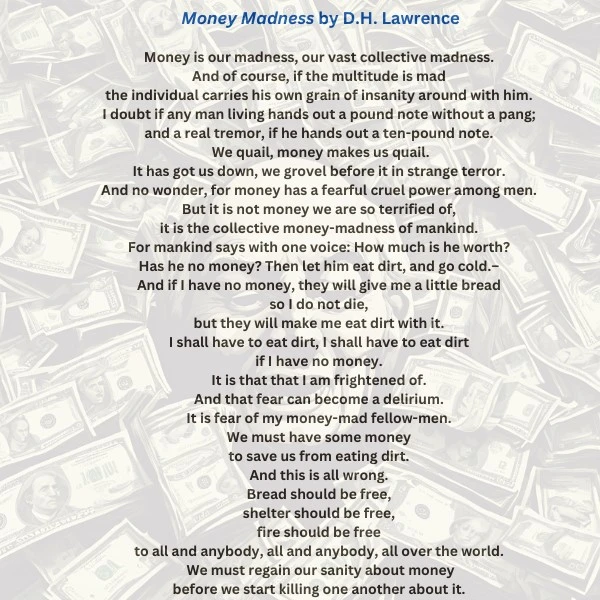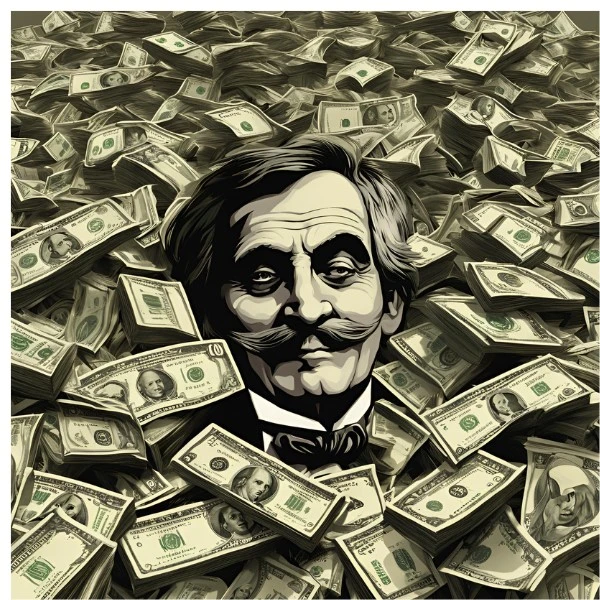Poem

Brief Biography of the Poet
David Herbert Lawrence (11 September 1885 – 2 March 1930) was an influential English writer and poet, renowned for his innovative and often controversial works that explored human relationships, sexuality, and the psychological depths of human experience.
Born in Eastwood, Nottinghamshire, Lawrence came from a working-class background. His father was a coal miner, and his mother was a former schoolteacher who encouraged her son’s intellectual pursuits. This complex family dynamic would later heavily influence his writing, particularly his exploration of family tensions and social class.
Lawrence began his career as a teacher but quickly turned to writing full-time after the success of his early novels. His breakthrough novel, Sons and Lovers (1913), was a semi-autobiographical work that explored the psychological impact of family dynamics and social constraints. This book is now considered a classic of modernist literature.
Throughout his career, Lawrence was a prolific and versatile writer. He wrote novels, short stories, poems, plays, essays, travel writings, and paintings. Some of his most famous novels include The Rainbow (1915), Women in Love (1920), and the notorious Lady Chatterley’s Lover (1928), which was banned for its explicit sexual content and only published unexpurgated in 1960.
Lawrence was known for his radical views on sexuality, human relationships, and social conventions. His work challenged the conservative sexual mores of early 20th-century Britain, often depicting sexuality as a powerful, transformative force. He believed in the importance of physical and emotional connection between individuals and was critical of industrialization’s dehumanizing effects.
His writing style was characterized by intense psychological insight, lyrical prose, and a focus on the inner lives of his characters. He was deeply interested in the connection between humans and nature, often using natural imagery as a metaphor for human emotions and relationships.
Lawrence’s personal life was as unconventional as his writing. He married Frieda von Richthofen, a German aristocrat, in 1914, and they travelled extensively together. Due to his controversial writings and pacifist views during World War I, he was often under suspicion and faced significant persecution.
In his later years, Lawrence suffered from tuberculosis, which ultimately led to his early death in 1930 in Vence, France, at the age of 44. Despite his short life, he left an enormous literary legacy and is considered one of the most significant English writers of the 20th century.
His works continue to be studied and celebrated for their psychological depth, revolutionary approach to sexuality, and critique of modern industrial society. Lawrence challenged literary and social conventions, paving the way for more open discussions about human sexuality and emotional complexity.
Summary of the Poem
The poem, Money Madness by D.H. Lawrence, is a powerful critique of society’s obsession with money and the dehumanizing effect of financial systems. Lawrence argues that money has become a collective madness that grips both society as a whole and individuals. He describes how people are terrified of financial insecurity, to the point where one’s worth is reduced to their monetary value.
The poet highlights the cruel power of money by illustrating how those without financial resources are treated with contempt. He emphasizes the fear of being unable to afford basic necessities like food and shelter, suggesting that lacking money means being forced to “eat dirt” – a metaphorical representation of social degradation and humiliation.
Lawrence calls for a radical reimagining of social structures, arguing that fundamental human needs – bread, shelter, and fire – should be free and accessible to everyone, regardless of their financial status. He sees the current monetary system as a form of collective insanity that threatens human dignity and potentially human life itself.
The poem’s core message is a passionate plea for humanity to “regain our sanity about money” before the pursuit and lack of money drives people to extreme and destructive behaviors. It’s a critique of a system that values financial worth over human worth, urging for a more compassionate and equitable approach to meeting basic human needs.
The repetitive language and raw emotional tone underscore the depth of Lawrence’s concern about the dehumanizing effects of money in society, making a powerful argument for fundamental social change.
Critical Appreciation of the Poem
Thematic Analysis
1. Criticism of Capitalism
Lawrence attacks the capitalistic framework in great length with dehumanizing implications. Money is not just an instrument of exchange but a cancerous influence on society that transforms human relations and value fundamentally.
2.Collective Psychological Shock
The term “our vast collective madness” speaks volumes as to the fact that there is a psychological condition concerning money wealth. He regards it not as an individual weakness but rather as a social disease afflicting many communities.
Structural and Linguistic Elements:
1. Spacing and Affective Intensity
However, the refrain of “I shall have to eat dirt” is an intensely felt pervasion of despondency and humiliation.
This helps highlight the psychological cost of financial crisis.
2. Rhetorical Approach
Lawrence sustains a series of emotional and philosophical reasoning:
-From individual fear (“I doubt whether any person living distributes a pound note without a pang of regret”)
-To a unanimous condemnation (“mankind responds in chorus: What is his worth?”)
-To a totalistic proposed solution (basic necessities should be free)
Psychological Theories:
1. Money As A Source of Terror
Money is described by Lawrence not only as a tool of practicality but as something that stamps “strange terror.” The verb “quail” speaks of some deep, nearly visceral fear about losing one’s financial security.
2. Dehumanization
The poem’s first major metaphor of “consumptive soil” represents societal exclusion. Lawrence argues that one cannot get dignity and elementary human rights with nothing in the pocket.
Philosophical Review:
1. Denial of Monetary Value as Human Value
He argues that a person’s value cannot be measured in terms of money. This is one of the most serious ethical faults of society.
2. Idealistic View
The poem culminates in a transformative suggestion: “Bread should be free, shelter should be free, fire should be free / to all and anybody, all over the world.” This implies an aspiration for universal human rights that goes beyond whatever economic framework exists.
Political Undercurrent:
This poem is neither overtly political; however, it does show strong feelings of socialism and humanism. Lawrence believes a system that only allows survival in certain basic realms through money.
Contextual Significance: Composed in the early 20th century, the poem encapsulates the social and economic strains characteristic of a period defined by rising industrialization, economic disparity, and social turmoil.
Literary Device: Lawrence uses free verse technique wherein the lines are uneven and with a colloquial tone. This style makes the philosophy discourse immediate and personal rather than being abstract.
Emotional Core: Apart from its cognitive discourse, the poem generally dwells on the psychology of fear—fear of losing, fear of being devalued, and fear of criticism against a system that turns people into mere economic units.
In conclusion, “Money Madness” is a passionate call for the recognition of human dignity that goes beyond economic measures, a condemnation of a system that reduces human existence to a commodity and degrades complex individuals to their ability to produce and consume money.
Multiple Choice Questions
1. According to the poet, money is our vast . . . . . madness.
collective
2. A man feels a real .......... if he hands out a ten-pound note.
tremour
3. Mankind's collective ........... is more terrifying than money itself.
money madness
4. ..........., ..........., and ...........should be free to all and anybody, according to the poet.
Bread, shelter and fire
5. According to the poem, what does the speaker describe as the "vast collective madness"?
a) Poverty
b) Greed
c) Money
d) Wealth
6. What emotion does money evoke in individuals, according to the poet?
a) Confidence
b) Fear
c) Happiness
d) Anger
7. The poet says that a man feels a "pang" when:
a) He earns money.
b) He hands out a pound note.
c) He counts his savings.
d) He receives a cheque.
8. What does the poet suggest is more terrifying than money itself?
a) Poverty
b) Wealth inequality
c) The collective mind of man
d) The economy
9. What items does the poet list as all that we really need?
a) Wealth, happiness, and love
b) Security, health, and money
c) Food, clothes, shelter, and love
d) Luxury, comfort, and money
10. According to the poet, what cannot be done with money?
a) Spend it
b) Invest it
c) Eat it, drink it, or wear it
d) Save it
11. What symbol of authority is mentioned as being stamped on money?
a) A president’s face
b) A crown
c) The image of a dead king
d) A country’s emblem
12. How does the poet describe the power of money among humans?
a) Generous and kind
b) Weak and negligible
c) Fearful and cruel
d) Fair and equitable
13. What ironic contrast does the poet point out about money?
a) Money is easy to earn but hard to keep.
b) Money is loved but often causes hatred.
c) Money is powerful, yet we don’t actually need it.
d) Money is abundant, but people are poor.
14. What does the poet say people do in response to money?
a) Work hard and save
b) Grovel and scuttle
c) Invest and prosper
d) Share and celebrate
15. What does the poet mean by "money makes us quail"?
a) Money gives us strength.
b) Money causes us to hesitate.
c) Money brings us joy.
d) Money terrifies us.
Answer the questions briefly (30-40 words)
1. What does the poet mean by "money is our madness"?
The poet means that humanity has an irrational obsession with money. This obsession controls and terrifies people, leading to collective fear and dependence on something that, in reality, has no intrinsic value other than what society assigns to it.
2. . Why does the poet describe money as having "fearful cruel power"?
The poet highlights that money creates inequality, controls human behavior, and drives fear and desperation. Its power stems from society’s collective mindset, which prioritizes wealth over basic human needs and values.
3. What is ironic about the way society views money, according to the poem?
The irony is that while money is treated as essential and powerful, it cannot satisfy basic human needs like food, drink, or love. The poet emphasizes that money is merely a symbol, yet people are enslaved by it.
4. What are the basic necessities of life mentioned in the poem?
The poet lists food, clothes, shelter, and love as the fundamental needs of life, contrasting them with the materialistic obsession with money.
5. How does the collective mindset of humanity contribute to money's power?
The collective mindset amplifies money’s influence by valuing it above all else. This shared belief creates societal pressure, fear, and madness, making money seem far more powerful than it truly is.
References:
Board of editors. Literary Mindscapes I. Macmillan Publishers India Pvt. Ltd. Chennai, 2021.


1 thought on “Money Madness by D.H. Lawrence”